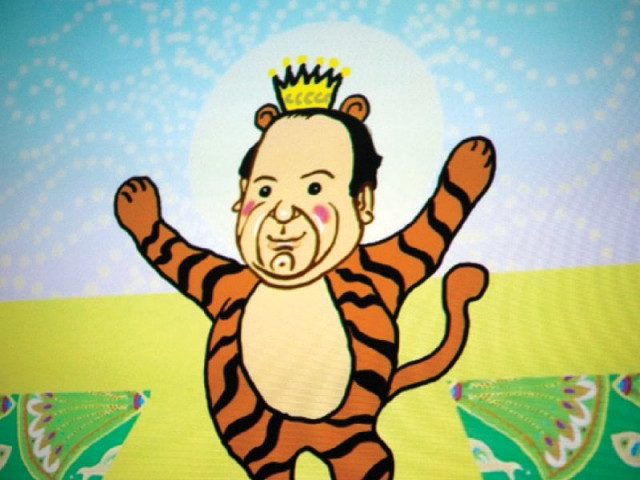Animation screening: Dream up a whole new country
An artist documents her moments of joy, amusement and fear through Election 2013.

The animated versions of politicians and activists are simultaneously comical and evocative. PHOTO: MYRA IQBAL/EXPRESS
Dubbed historic, Elections 2013 remain a hot topic for discussion at any public forum. While many reel from the highs and lows of the election season, one woman decided to put these conflicting emotions to use: she documented them into an animation film.
Titled “Election Diary: A Tale of Two Countries,” the film was screened at Aqs Gallery on Wednesday. Brainchild of activist, author and artist, Fauzia Minallah, the 20-minute-long film boasts of creative expression rather than political analysis.
“While it was one of the bloodiest elections with hundreds of party workers losing their lives, it also saw the participation of thousands of people with so much hope,” said Minallah. She added that the film was a tribute to the resilient people of Pakistan, especially those who participated in the election with clear and present danger.
The film opens with the verse, “It was the best of times, it was the worst of times,” taken from Charles Dickens’s classic, “A Tale of Two Cities.” However, the “countries” that Minallah has conjured up, are “Naya Pakistan” and “The Facebook Republic of Twitteristan”, hinting at stereotypical political campaigns versus a social media revolution vying for change.

The animated versions of politicians and activists are simultaneously comical and evocative. The victims of militancy at a girls’ school in Swat, Shia genocide in Balochistan, the killing of countless Christians, Hindus, Ahmadis and army personnel, are all blanketed under a rain of red teardrops.
Then there are scenes of a bed-ridden Imran Khan, following his fall from a forklift, with a garland of roses photoshopped around his neck. Through doodles, audio and video footages, the film backtracks to the oppressive regime of dictator Ziaul Haq. Benazir Bhutto is shown to be a harbinger of hope, even when she was in office but not in power. There are references to Zia being dead yet still alive. However, the core essence remains the hope of democracy through the darkest of times.
Veteran classical dancer Indu Mitha, who was also a chief guest, supported the notion of having faith and taking concrete steps to steer the country into a positive direction. However, she did not appreciate “the jazzed up version” of Iqbal Bano’s ghazal “Hum Dekhenge” in the film.
Renowned poet Kishwer Naheed, the other chief guest, said she was moved to tears during some moments of the film and lightened up during others. “This is the life we have been living, we are living and which we will continue to live,” she said.
Rights activist Tahira Abdullah, who has witnessed eight consecutive elections as an election observer, commended the film’s idea and execution. Regardless of social strata, she added, the film speaks for anyone who yearns for a progressive Pakistan and should be entered into international film festivals.
Published in The Express Tribune, June 14th, 2013.



















COMMENTS
Comments are moderated and generally will be posted if they are on-topic and not abusive.
For more information, please see our Comments FAQ